June, 1967
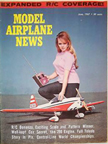
Model Airplane News Cover for June, 1967
Dehaviland DHC-1A1 "Chimpunk"
Click to Enlarge
Here is what the blurb about the cover has to say:
"...Charlene Jones, "Sweetheart" of the Palm Springs Classic poses prettily with Jack Stafford's "Chipmunk," this month's feature construction article. This excellent multi- [channel RC] machine can be a double winner for you -- it's a fine pattern machine that can win Class III [unlimited controls] and then turn around and win a scale event as well. Climb aboard MAN's bandwagon of winners. Cover photo Richard Tichenor ..."
About the Model
The model grew out of a MAN article in the August 1966 issue of that showed a three-view of the Chipmunk in the "Planes Worth Modeling" feature. Considerable work was required to convert the full-sized plane into a model that would be faithful to scale but would be able to compete in the acrobatic ("pattern") radio control contests. The design has a tail wheel that makes it a bit trickt to taxi, especially in cross winds. It also uses an inverted engine that enhances the scale appearnce and pays dividends in acrobatic flying.
You can read the entire article by clicking to enlarge the photos below.
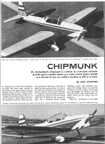
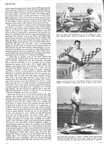
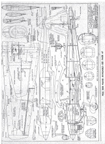
Jack Stafford's Dehavliiand Chipmunk
Click to Enlarge
About the Full Size Airplane
The de Havilland Canada DHC-1 "Chipmunk" is a tandem, two-seat, single-engined primary trainer aircraft which was the standard primary trainer for the Royal Canadian Air Force, Royal Air Force and several other air forces through much of the post-Second World War years. The de Havilland Chipmunk was the first true postwar aviation project of de Havilland Canada. Today, over 500 DHC-1 Chipmunk (affectionately known as "Chippie") airframes remain airworthy with more being rebuilt every year.
British-built and early Canadian-built Chipmunks are notably different from the later Canadian-built RCAF/Lebanese versions. The later Canadian-built airplanes have a bubble canopy, while early Canadian, and all Portuguese and British examples have the multi-panelled sliding canopy, the rearmost panels of which are bulged for better instructor visibility.
From the 1950s onward, the Chipmunk also became a popular civilian aircraft, being used for training, aerobatics and crop spraying. Most civilian aircraft are ex-military.
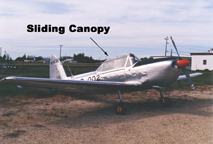
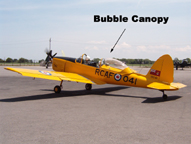
de Havilland Canada DHC-1 "Chipmunk"
Click to Enlarge
Here is a very nice video of a restored Chipmunk in flight:
In addition to Model Airplane News, this airplane was also featured in the WINGS "Friend or Foe" trading card series of the early 1950s
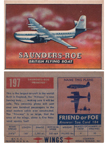
Trading card representation of the de Havilland Canada DHC-1 Chipmunk
Click Here to see all 200 cards in the series
Click to Enlarge
Click here to learn more about the Dehavilland Chipmunk.

Click to go back and select another cover.
Counter for the Entire Site (not just this page..)
Home | About Lindy | Last Week's Reviews | Upcoming Events | 1940s Collecibles
The Guide - Establishments - Travel - Accessories
Music | Links | Photo Gallery | Extras | Contact